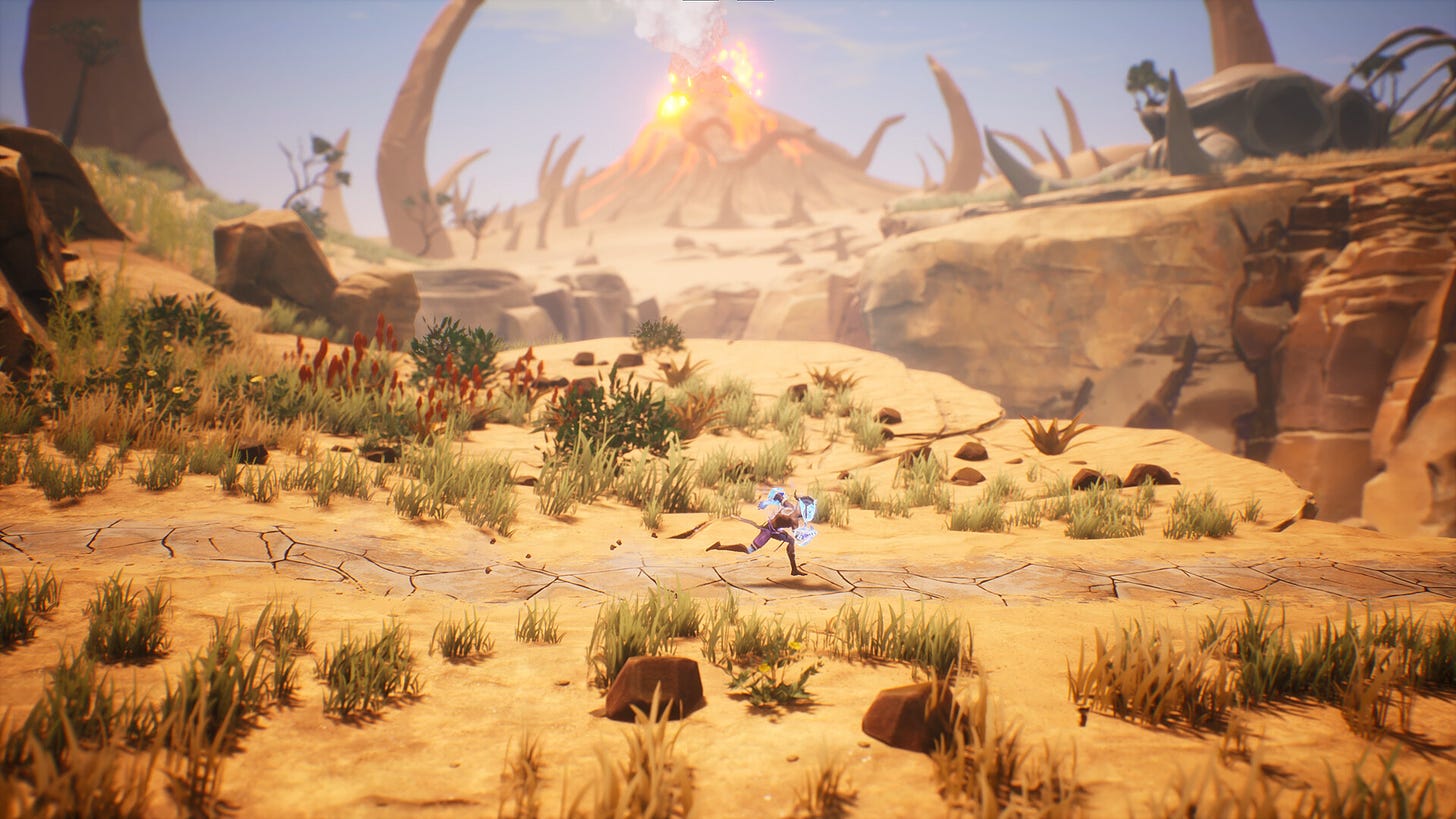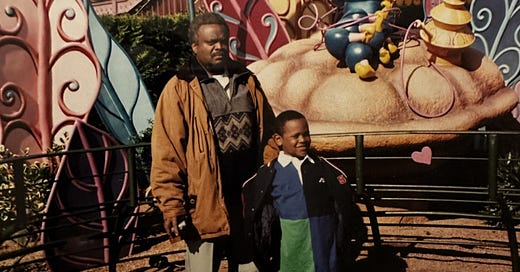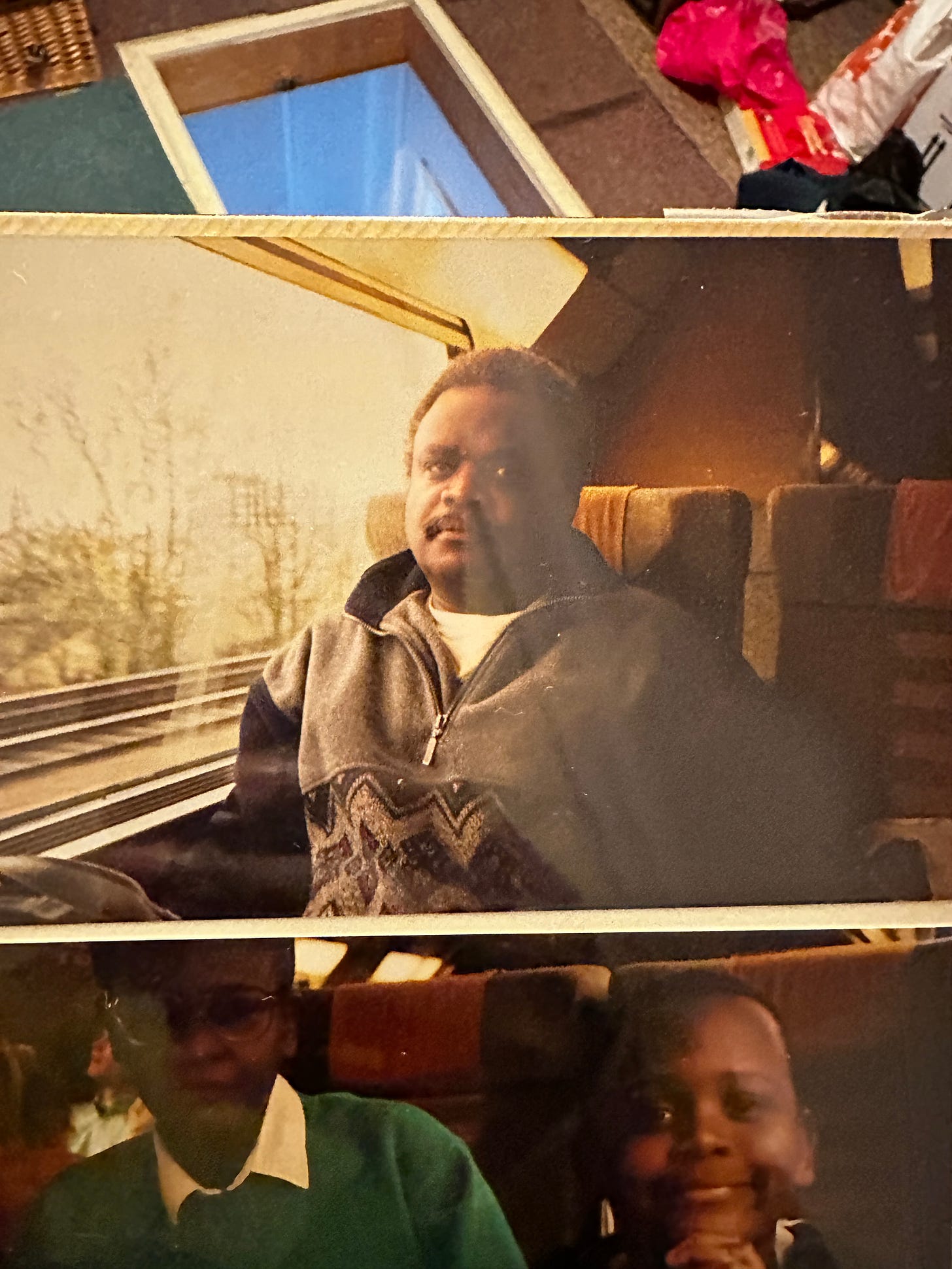How Years of Grieving Led Abubakar Salim to Honor His Father By Making a Video Game
The death of a parent makes you do weird and unexpected things. I can relate.
Grief is a rollercoaster. Some days, pain. Other days, joy. At times, it’s both—or nothing. At grief’s origin, we participate in somber public rituals, like a funeral, to acknowledge the events. But afterwards, grief becomes private, awkward. People don’t want to ask if you’re sad, and you’re not sure if you want them to ask. Sometimes you want to punch a wall. Sometimes you want to yell. Sometimes you wish someone would just put their hand on your shoulder for a moment and ask “are you okay?”
“The first few years after he passed was almost like a blur,” said Abubakar Salim, creative director on this week’s new game Tales of Kenzera: ZAU, voice of Bayek in Assassin’s Creed Origins, and an actor featured in shows like Jamestown and Raised By Wolves, in a recent interview with Crossplay. “The way I describe it was almost like having my rose tinted glasses yanked from my face, and everything became vivid. I think the biggest thing that shocked me was the fact that the world continued to spin.”
“He,” in this case, was Salim’s father, who died of cancer in 2013.
When Salim revealed Tales of Kenzera: ZAU at The Game Awards last year, I remember muttering to my colleagues “oh, I’m in trouble.” Gripped with emotion, Salim revealed his first attempt at making a video game, a hard enough feat on its own, would be developed through the lens of grief. Making the Metroid-inspired Tales of Kenzera: ZAU, where a young shaman makes a desperate attempt to bring the spirit of his father back to the land of the living, would be an extension of his own journey.
That’s much harder.
I felt a kinship with Salim because as many who read Crossplay already know, in 2012, my father died of a heart attack. The day I picked up my phone and was told my father had died, mere weeks ahead of my wedding, my entire world shattered. My father was 56 years old, and it had never entered my mind there could be a version of it without him. Cancer, I suppose, at least comes with a warning label, but as the years have gone by and I’ve watched others lose their loved ones…well, if we are all destined to lose people, perhaps the way my father went was one of the better options. But I digress.
When Salim stepped on stage at The Game Awards, one important person in his life was not aware that he was about to work through grief in a public way: his mother.
“She knew I was making a game,” he said. “I just had to do it. I had to do it without the questioning of being like, ‘is this the right thing to do or isn't it?’ That's where it came from.”
It helped, of course, that it was very late at night for his mother at the time. She slept through the announcement. The awkward conversation he’d been sidestepping for several years, as he was acting in Hollywood and building Tales of Kenzera: ZAU with a team of 30 developers at Surgent Studios over the past four years, was sidestepped for a little while longer. But when morning arrived, the conversation finally happened.
“She called and was like, ‘I see you're making the game about your father,’” he said. “And I'm like, ‘yeah, that's what I'm doing.’ She was like "that's pretty cool, that's how you're gonna handle this."
Salim credits his father with nurturing his initial relationship with video games. Salim, who is dyslexic, found it difficult to engage with books, and despite being known these days as an actor, TV and movies weren’t calling to him, either. Games proved hypnotic, however, and his father noticed the spell it was casting on him.
“This is a time when games weren't necessarily seen as a good thing,” he said. “It was seen as like, ‘oh, no, this is a distraction from real life.’ But I think my father could tell my enjoyment and see my enjoyment in this space and he allowed me to enjoy.”

The two would pass the controller back and forth. Salim fondly remembers many pained attempts to navigate tricky sections of Sonic the Hedgehog on the Mega Drive, aka the Genesis, his first console. (The Mega Drive was known as the Genesis only in North America.) Over time, Salim noticed his father would pass on turns, giving Salim a chance to keep playing. But even when the TV was off, Salim’s father would patiently listen to stories about the adventures Salim was going on in these worlds.
“That was really lovely, and really kind of great,” said Salim, “because I was like, ‘oh, yeah, my dad's interested [in] hearing me talk about Sonic and his adventures against Dr. Robotnik and that kind of stuff. It was a shared one that turned into him being like, ‘cool, keep going and doing your thing and let me know.’”
It’s unlikely Salim’s father really knew, or really cared, about the battles between Sonic and Dr. Robonik. In the same way that my father didn’t really know, or really care, about me trying to explain why it was such a big deal that Square was merging with Enix in 2002. But both our fathers nodded their heads, because they recognized one of the most lasting gifts a parent can give is showing an interest in their interests.
Years later, of course, Salim’s father dies.
“For the first few years,” said Salim,” I was very much [feeling like] I don't know how the hell I'm gonna continue. This wasn't part of the plan. He was supposed to see me have my kids, get married, all this stuff didn't happen. And so I was dealing with that. Then, after a while I was like, ‘okay, actually, you know what, this isn't going to change, I have to get used to this, I have to be comfortable with it, I'm never going to accept his passing. I'm going to kind of accept it? But I'm never going to accept the fact that I'm going to be like a-okay, all the time. You just get comfortable with it.’ Being an actor, I was thinking, ‘god, man, I've got to process this, I've got to tell this, I've got to share this, this is a story that I need to get out of my system.’”
He explored the idea of making a film, or even a TV series. But nothing fit.
I can relate. Talking about my father’s passing publicly was not a calculated plan. It just happened. In the weeks, months, and years after the inciting incident, when you’re mostly left to continue walking that journey of grief while the rest of the world simply moves on, I found my feelings about my father’s passing constantly finding its way into my work. There were moments where I would delete a passage in a story I was writing where I’d make reference to him, because surely people must be sick of hearing about my sob story, only for me to place it back in, because I’m sorry, but viewing the world through this lens is all that I have to offer anyone. And the world usually responded in kind, with people reaching out to share stories of their own.
The idea for game-as-grief-processing came to Salim on the set of Max’s sci-fi epic, Raised By Wolves. (The pilot for that show, directed by Ridley Scott, is incredible.)
“I was playing Ori and the Blind Forest on the Switch,” he said, “and there's a specific moment, this waterfall level essentially, where it took me ages to complete this. It was a pain in the ass. The moment I did, the elation that I felt—I was happy and proud of myself. I remember that feeling. I don't think I've ever felt that way, until I played Sonic when I was with my dad, doing this thing and completing this level that we kept dying at—and it just clicked. That was it. This is how this is how I remember it. This is what speaks truthfully to me.”
Making a video game about grief sounds powerful on paper, but in practice, it’s tricky. It’s why most games leave emotions to cutscenes. What does it mean to imbue game mechanics with…grief? Some concepts are obvious, others more subtle. Choosing to make Tales of Kenzera: ZAU a Metroid-inspired game, for example, was because the genre itself is about "this huge, scary world” where “you have no idea where to begin and where to end, but you have to keep going, which is essentially grief.”
Others, however, are more pointed.
“You need health upgrades in games,” he explained. “What actually is healing? Talking about it. Hence why ‘reflections’ in the game is where Zau literally sits under the baobab tree and speaks with the god of death about just how he's feeling. And sometimes, you might not even say anything at all. You get your max health that way.”
Moments like this are all over, but it’s not oppressive, nor at the expense of fun. Tales of Kenzera: ZAU has the misfortune of coming months after Prince of Persia: The Lost Crown, a game likely to be viewed as an all-time Metroid-style game, but having played several hours myself, I can say that Tales of Kenzera: ZAU is a powerful and impressive game, and not merely when viewed with a kindness of being a “first effort.”
I wondered, then, if making a game so personal, so wound up in Salim’s emotional journey, would make it difficult if people started picking it apart upon release.
“I've been so vulnerable and open myself up to everyone,” he said, “ it doesn't hurt what's said or what's shared it, because I know for a fact that I've just been as honest and as authentic and truthful as possible. Funnily enough, even though it is that element of like, ‘oh my god, what have they been saying?’ I think that the excitement and the fear is a sense of ‘oh, man, now the world are really seeing it. But at the end of the day, I'm really happy with it, and I know the team are, as well, and that's what matters.”
We spoke ahead of reviews for Tales of Kenzera: ZAU, but they’ve been positive, with many critics responding to the charge of emotions Salim’s imbued the game with.
Tales of Kenzera: ZAU likely wouldn’t exist if Salim’s father was still around, but I couldn’t help but ask what his father might think of the game, if he could see it.
“I think he probably would have said ‘hey, buddy, maybe just buy a car. Maybe go outside, man,’” he joked. “But I do genuinely think he would be proud. I see it through my mother, she's not really into games. It's not that she didn't understand, she was just like ‘okay, that's you and your dad.’ But she gets it and she feels connected and she feels seen by it. She loves not only seeing the fact that it is [voiced] in Swahili, she loves the fact that we're making these choices and playing in this world, and that it comes from a place of love. I think that's what really stands out.”
Have a story idea? Want to share a tip? Got a funny parenting story? Drop Patrick an email.
Also:
I’ll be publishing a podcast version of this interview this week, which will be available early for Crossplay subscribers. You’ll be able to hear it on Wednesday.
I’m not joking about the Raised by Wolves recommendation, by the way. The rest of the show is a pretty mixed, but the pilot is a truly great slice of science fiction.
I’ve played probably half of Tales of Kenzera: ZAU, and have heard the ending is pretty special. I’ll have to report back, likely in tears, when I make it to the end.






